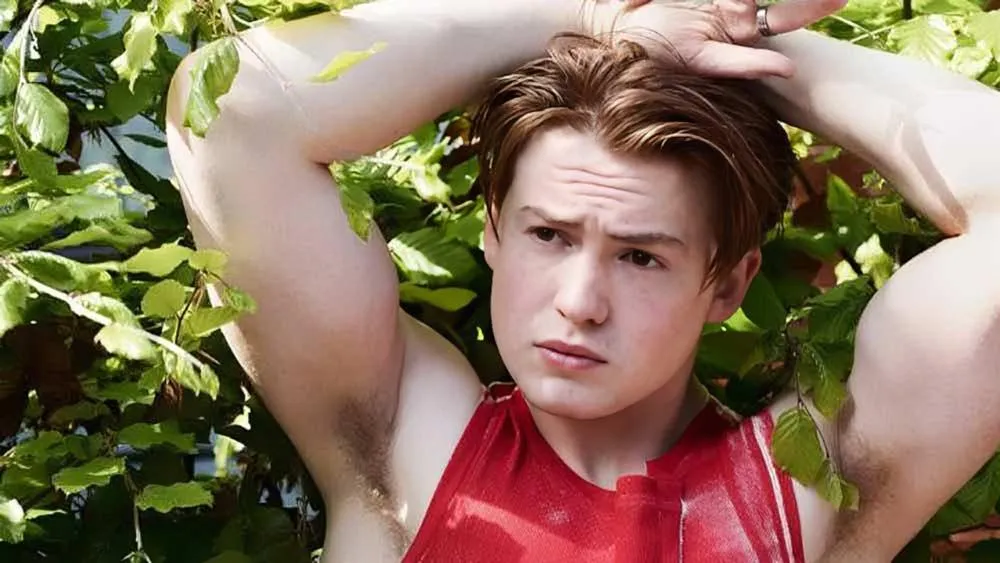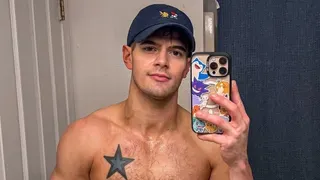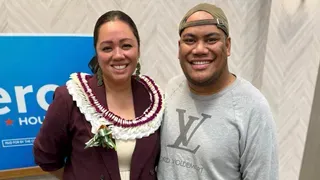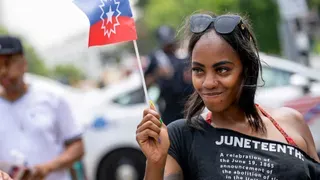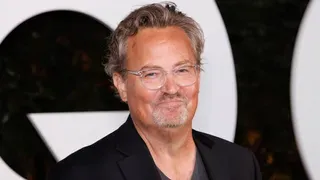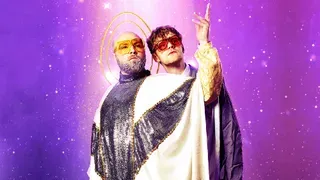September 4, 2015
Talking 'Boys in the Band' With a Couple of the Boys
Kilian Melloy READ TIME: 19 MIN.
Following highly acclaimed productions of "Punk Rock," "Bent," "The Normal Heart," "The Submission," and many others, Zeitgeist Stage Company is now putting up a production of the classic Mart Crowley play "The Boys in the Band."
It's a story that unfolds over the course of a tumultuous birthday party. A group of friends gather to celebrate sexy, arrogant Harold - who, despite being the focus of the occasion, remains absent well into the revelry. Meantime, Michael, the host and organizer of the fete, receives an unexpected visitor in the person of his longtime straight friend, Alan, who is distraught for reasons he's unwilling to disclose. Michael assumes Alan is about to reveal that he's a closeted gay man trapped in a miserable, loveless heterosexual marriage - but is that likely? Or is it Michael's psyche, tormented by his Roman Catholic upbringing, projecting his own fantasies? (And who can't identify with that? Let's face it... how often do we indulge in magical gay thinking when it comes to some straight hunk who's just too handsome, too smart, and too charming to play for Team Heterosexual?)
"The Boys in the Band" - which premiered in 1968 - was both hailed and reviled as one of first, if not the first, significant "gay" plays. "The Boys in the Band" created controversy - it still does; more on that later - but it was also a white-hot hit, playing for more than 1,000 performances during its inaugural run and hitting the silver screen in a movie version only two years later.
GLBT-themed plays have become almost ubiquitous, but this granddaddy of the genre still has the power to provoke. Boston audiences will thrill to the casting, which includes a regular rogue's gallery of favorite faces: Diego Buscaglia (drop dead funny in Apollinaire's production of "Stupid Fucking Bird" a couple of seasons ago, and, more recently, featured in "Bent" and "The Submission" with Zeitgeist); Mikey DiLoretto (part of the cast for Happy Medium Theatre's Elliot Norton-winning production of "Dog Sees God" and Zeitgeist's IRNE-winning "Bent," not to mention winner of the IRNE for Best Supporting Actor for his work in Zeitgeist's "The Normal Heart"); Brooks Reeves (winner of the IRNE for Best Supporting Actor for Zeitgeist's "Bent,"); Bob Mussett (the Lyric Theater's production of "Light Up the Sky"; Fresh Ink Theatre's production of "Priscilla Dreams the Answer"); Gene Dante (Fiddlehead Theatre Company's production of "Aida"; Elliot Norton nominee for the ART's production of "The Rocky Horror Show"); and Damon Singletary (Lyric Stage's "City of Angels" and Company One's production of "Colossal").
But the two heavyweights who anchor the play - indeed, who portray Harold and Michael, the yin and yang that define "The Boys in the Band" - are none other than The Gold Dust Orphans' leader and longtime Boston stage titan Ryan Landry, the recent recipient of the Elliot Norton Award for Sustained Excellence, and the always-impressive, often-nominated (and multiple winner) from both the IRNEs and the Elliot Nortons, Victor Shopov. It was with no little glee that EDGE interviewed both Landry and Shopov on the upcoming production of Zeitgeist's "The Boys in the Band."
EDGE: First off, Ryan, congratulations on your Elliot Norton Awards win for Sustained Excellence. It must feel like a validation of your 20 years of hard work on the Boston theater scene. Did you see that one coming?
Ryan Landry: Not at all. I had no idea that I would even be considered. It was truly one of the high points of my life and I am extremely grateful. This is the biggest award in Boston theater, and it was very kind of the New England Theater Critics Association to award me with this honor.
Of course, it was twice as gratifying for me in particular as it is no secret that the Orphans were treated rather poorly by the press way back in the beginning. I distinctly remember telling several of those same critics to "fuck off" years ago. Who would have thought I'd eventually get an award for it?
EDGE: You're the driving force behind the Gold Dust Orphans, but in recent years you have branched out quite a lot. Your play "M" was produced at the BCA; you appeared at the ART's Club Oberon in the role of Dr. Frankenfurter in a production here of "The Rocky Horror Show"; and now here you are joining Zeitgeist. How did your participation in this production come about?
Ryan Landry: I have been friends with David Miller for quite a long time. I feel that Zeitgeist does some of the best, most organically creative work in the city. Although David never contacted me to ask if I would join the cast, I saw somewhere on Facebook that they were casting and immediately wrote to David, asking him who would be playing Harold. This is a part that I have wanted since I first saw the movie. Now I have the part, and can't wait to play it.
EDGE: I saw you a few weeks ago in Provincetown in "Thoroughly Muslim Millie," which played here in Boston a few months ago. Hilarious! Plus, congratulations on the creative ways you found to introduce some absolutely first-rate eye candy into the production.
Ryan Landry: If you are referring to the naked chorus boy at the end of Act #2, I will have you know that there happened to be an unfortunate wardrobe malfunction that night ...
... And every other night for six months.
EDGE: You do, what, three shows a year with Gold Dust Orphans, writing the scripts and taking an acting part? How do you manage that pace? Will the coming season see three new GDO productions? What about non-GDO roles?
Ryan Landry: We used to do five shows a year. I think three shows a year is lazy, but then my mother worked the graveyard shift in the same factory for over forty years and only took one day off a week during all that time. If she were alive today she would probably frown on the fact that I'm not doing more with my days.
As far as non-GDO roles, I'm pretty much booked until this time next year so I seriously doubt that you will see any more from me than what has already been written down. But then you never know. There's always the graveyard shift.
EDGE: Let me not neglect the other party in this interview, Victor Shopov! Victor, you've been in a number of hard-hitting plays with gay characters and themes, including "The Normal Heart," "Bent," and the amazing "The Submission." How did you end up in so many "gay" plays? Was it a matter of these being the roles the universe tossed your way, or were you self-selecting into those roles?
Victor Shopov: Well, as a friend pointed out - know your brand and run with it. But in all seriousness, when I approach a role, I always start with, "Who is the person and what does he want"? It doesn't matter if they are gay or straight - I think I've actually played more straight roles onstage than gay (or at least it's pretty close at this point) - what matters is the human drive; the core components that make a person tick.
To that point, the first gay character I played onstage was Peter Patrone in "The Heidi Chronicles" back in 2008, and my director told me that the main reason I got the part above others was that I played him as a person, not a caricature.
I don't self-select these roles - I'm an actor, I take what I can get! - but I do think I've developed a niche for playing certain types of characters (charismatic jerks, or so I have been told) who may or may not be gay; I think the latter aspect is secondary to the rest.
For example, while my characters in "The Normal Heart," "Bent," and "The Submission" were all gay, and being gay fueled much of their arcs, it was not the only aspect of their natures that influenced their journeys.
A lot of these roles took place with Zeitgeist Stage Company (ZSC), and David Miller, the Artistic Director for ZSC, has been doing somewhat of a backwards march through gay theater milestones. When I learned that he was chasing down the rights to "BITB," I was obviously interested. We talked it over and the role of Michael was a good fit for me, so it worked out nicely. I've sort of learned that nothing is really a "given" when it comes to casting, but David and I have worked really well together for years, so I know that he has a good eye for roles that fit me, and he knows he can trust me with them.
EDGE: You were just in a play for Wax Wings, "Eyes Shut. Door
Open," starring opposite Michael Underhill in an intense story about two brothers. What was that experience like? I'm not sure that production got the attention it should have.
Victor Shopov: "Eyes Shut. Door Open" was an amazing experience. We had a compelling new script, a terrific production crew, and a three-person cast that worked seamlessly together. I'm really proud of what we accomplished, but I agree that we didn't quite get the attention I think the production earned and deserved. The show was originally supposed to go up in the Factory Theatre, but when it closed, Wax Wings was forced to seek an alternate space, and as anyone operating on the fringe scene will tell you, that's not an easy thing to do, especially on short notice.
However, we did wind up in a great space with the Inner Sanctum in Dudley Square, but because it was the first time anyone was utilizing it for a theatrical production, we had some challenges getting bodies into seats. Still, those who did see the show responded really positively to it, and I'm hopeful there may yet be life in the production at some point in the not-too-distant-future... So, stay tuned!
EDGE: Ryan, you're known for your work in comedy, but "Boys in the Band" is a drama. I've heard it said that comedians make for the best dramatists; what are your thoughts about playing it ... well, not straight, but serious?
Ryan Landry: There are many funny moments in "Boys in the Band." Some might even consider it a comedy. Also, many Orphan shows have a very serious side. Any actor worth his/her salt loves playing both drama and comedy and personally, I consider it all in the same game. The question here isn't really "comedy or drama" but whether or not the actor/actress can pull it off. Will the audience buy it?
I am hoping that they will and that I'll be allowed the chance to step outside Machine/Provincetown and prove myself as an actor. If not, I will understand. No one likes to see their clown sad. But if they do, I will be thrilled knowing that I was allowed this one opportunity to shine outside my own personal "Tiffany's."
EDGE: You play Harold in the upcoming production of "Boys in the Band." If one looks around online at what's been written about the play and its characters, one sees the characters often reduced to stereotypes; one is "flamboyant," another is "self-loathing," and there's a couple who are in the midst of a disagreement about whether or not to be monogamous. But Harold is harder to characterize. How would you describe him?
Ryan Landry: I believe Harold to be one part "Early Hippie," one part "Queen Bee" and one part Satan. He has become so jaded over the years that he's made it into an art. Yet he is human, and perhaps the only character in the play living in reality.
This is not to say that the other characters are not "real." They are all very real.
EDGE: Victor, how are you approaching the role of Michael, who seems to have some self-loathing and internalized conflicts with his religious background?
Victor Shopov: This somewhat goes back to the earlier question about the stereotypical "self-loathing gay." Again, I think self-loathing is a human trait, not just a gay or a straight one.
However, I do think there is a certain degree of externally programmed self-loathing when it comes to being gay, and what I mean by that is young gay men and women are so frequently taught that there is something wrong with them - that they are broken, deficient, or abnormal-that they are freaks or perverts - and I'm sorry, but most of that is fueled by religion and/or culture. These kids are taught to hate themselves from an early age, to deny who they are, so of course they are going to grow up with those sentiments buried inside them - sentiments that are going to seek outlets and relief wherever and whenever they can. The Michael we see in "BITB" is a perfect example of that.
EDGE: Along those lines, it is true to some extent that "Boys in the Band" has gotten something of a bad rap for its portrayal of gay men, which some find to be a collection of stereotypes: The self-hating gay, the hustler, etc.
Victor Shopov: Yeah, I've heard and read that as well, but I think that particular criticism of "BITB" is somewhat lazy and inaccurate. I think we all have a tendency to drop people into categories (or to stereotype them) because it is an easy, safe way of identifying something that we might not otherwise understand. We do it all the time when it comes to race, ethnicity, gender identity, sexual orientation, culture, religion, etc. - we make assumptions about groups and individuals based upon one particular aspect of who they are and then proceed to paint the rest of them with the same brush. We're all guilty of it, consciously or otherwise, whether we like it or not.
All that said, each of these characters in "BITB" display qualities that are universal across the human spectrum. Self-loathing is not a uniquely "gay" trait. Heterosexual couples deal with issues of fidelity and commitment just as much as homosexual couples. All of us deal with uncertainty and insecurity in our own identities to one extent or another. If someone look at "BITB" and says, "Well, Michael is clearly Gay Male Type A, Emory is Gay Male Type Q, Larry is Gay Male Type T," and so forth, then they are looking at the play, and probably the rest of the world, through a narrow-minded lens that ignores the complexity of human nature.
Ryan Landry: This idea that the characters in "Boys in the Band" are only stereotypes is an insult and a lie. They existed. I was there. I know. Just as anyone over the age of fifty would know. To say that they never existed is like saying that "Jim Crow" never existed. That the denial of women's rights never existed.
I grew up and came out knowing people just like Harold, like Michael, like Emory.
This is why the play means so much to me. Because they lived. And I would think that the situation illuminated in the play is something that most likely happened.
EDGE: You two play the "linchpin" characters of the play, so to speak. What's it been like working with each other? What kind of creative chemistry have you two got?
Ryan Landry: At first I don't know if Victor thought that perhaps I was going to eat him. I know there are stories of my being a monster in rehearsals and that is partially true. I won't deny that. But really it is only about the work and my fear of not getting it perfect. Of the cast not getting it right. The work must be perfect, or as close to perfection as the director can get it before opening night. Now that we have more or less warmed up to each other, I think Victor realizes that I am not there to one-up him at all but to actually support him.
I am being sincere when I say that Victor is a truly great actor and works just as hard as I do to get it right. So I have developed a great respect for him. If that's called "chemistry" then yes. It is definitely there. For me anyway.
Victor Shopov: Ryan is a joy to work with. I had never met him prior to this process, but I was impressed and moved by his speech at the 2015 Elliot Norton Awards where he received the Sustained Excellence award, and when I found out he would be taking on the role of Harold, I was really excited to go to war with him onstage.
That is, of course, somewhat of an exaggeration - I think the Michael/Harold dynamic is much, much more profound than just a couple of witty "frenemies" lobbing grenades at each other across the living room table, and I think Ryan and I have found a relationship that is very different from what people might expect, especially those who have seen or read "BITB" before.
It is so easy to have a two-hour "bitchy Michael/Harold fencing match" that I think people have, in some ways, come to expect from "BITB," but I think David, Ryan and I have found a different chessboard on which to play this out. There is something very deep and profound going on beneath the surface of Harold and Michael's relationship - we get a lot of breadcrumbs along the way, but no definitive answers - and the direction we're headed lends itself to something that, I think, is much more interesting and much more moving
EDGE: This is an interesting time for a new production of "The Boys in the Band." The play premiered in 1968, when gays were scorned, derided, and persecuted to a much greater degree than is now the case. Just this last June we finally secured the right to marriage equality nationwide. What does the play have to tell us in 2015?
Ryan Landry: That we were once far more aware than we are now. The fact that we were hunted and considered freaks back then actually made us stronger, more of a community. Things were more urgent then, more alive. We truly loved one another. We looked out for one another.
Through all the sadness and fear thrust upon us at the time it was one of the most beautiful, poetic and humane periods in our history.
Unlike Judy, on the day that Madonna drops there will be no Stonewall. Just twenty million Queens trying to take a "selfie" next to the casket.
Victor Shopov: I'm going to push back on that just a little bit. Yes, enormous strides have been made in this country when it comes to acceptance and understanding, but there is still exists tremendous adversity and hostility, openly and otherwise, toward gays in this country and elsewhere in the world, often in far more dangerous terms depending on where one might be. There are still something like 80 countries where homosexuality is "illegal" (and I'm using quotation marks there for a reason), and punishable by death in eight of those. So, while we in this country can celebrate marriage equality, there are millions of people elsewhere in the world who would settle for simply being able to go through the day without having to worry about being arrested or murdered simply for being gay.
Here in the U.S., despite amazing legal victories over the last ten years, there is still an upward battle against ignorance and bigotry. For example, a county clerk in Kentucky has flouted the Supreme Court ruling by simply refusing to issue marriage licenses to anyone. Despite the fact that she is a public employee, and thus answerable to the entire public, not just those with whom she shares personal beliefs, she is, predictably, hiding behind the "religious freedom" excuse.
Then there is the insane clown car posse known as the Republican presidential candidate lineup, where all one has to do is listen to them attempt to intellectualize how homosexuality is akin to pedophilia and bestiality (Rick Santorum), or to accuse us of "liberal fascism" for expecting people to comply with the law (Ted Cruz), or to sign the National Organization of Marriage's pledge (Ben Carson and Bobby Jindal) to "repeal" gay marriage.
And the thing is, they are saying these things because it is what their constituents/potential voters want to hear. It is dangerous and pathetic, but more than anything, it's just very sad.
I think "BITB" still has tremendous relevance almost 50 years after it was first produced. When we did "The Normal Heart" a few years ago, I spoke with a lot of younger gay men who said things like "I had no idea that's what it was like... I didn't realize how difficult it was back then... I thought I had it bad now..." - all things that I myself thought and felt throughout the process. I am acutely aware that my life is profoundly easier because of the efforts and struggles of those who came before me, and I am extremely grateful for that.
That said, there is obviously going to be a generational divide when it comes to the response to BITB - the people who lived through the time and those who came after it - but I'm hopeful that there is still something to be gleaned from it by everyone, and I think that there is.
One of the key takeaways from BITB is the famous line: "If we could just learn not to hate ourselves quite so very much." What I think may be more on-point is that we simply need to learn to be kinder to each other, and to ourselves, and again, that goes for everyone, everywhere.
EDGE: Mart Crowley wrote a sequel to the play, but let's imagine you were to come up with present-day updates on your characters. Where would they
be? How would they have changed?
Victor Shopov: I would like to think that present-day Michael would have found the help he needed with respect to his alcohol addiction, as so much of his struggle is fueled and exacerbated by that. Having seen first-hand what addiction does to a person, I can tell you that it is a merciless, horrible disease, and there is no magic remedy or simple cure-the best you can do is learn to live with it and to control it as much as possible without letting it control you. As someone once said to me, you may be able to stop drinking, but you can never stop being an alcoholic.
Back to the subject of self-loathing for a moment, Michael is particularly adept at it, and it sabotages his life in more ways than one. Add in the alcohol addiction above, and you have a recipe for personal disaster. If Michael could learn to be OK with himself, to not punish himself for being who he is, the rest would then, in many ways, attend to itself, and maybe - just maybe - he could find some true happiness along the way. That's what I would hope for Michael, and that's what I would like to think the experience portrayed in "BITB" may have finally shown him.
Ryan Landry: [Harold] would have totally pulled out of the gay scene. He would have found it an embarrassment. Dance floors full of shirtless men trying to be topless women at a tittie bar would have made him ill.
He would have said, "This has nothing to do with freedom, this soft porn version of gay life. Make it dirty, raunchy porn or don't make it at all."
"RuPaul's Drag Race" would have bored him to tears.
He would probably leave New York and move to some other island. Preferably one without a Starbucks.
Zeitgeist Stage Company's production of 'The Boys in the Band' runs at the Boston Center for the Arts from Sept. 11 - Oct. 3. For more information, please visit http://www.zeitgeiststage.com/index.html
Kilian Melloy serves as EDGE Media Network's Associate Arts Editor and Staff Contributor. His professional memberships include the National Lesbian & Gay Journalists Association, the Boston Online Film Critics Association, The Gay and Lesbian Entertainment Critics Association, and the Boston Theater Critics Association's Elliot Norton Awards Committee.
